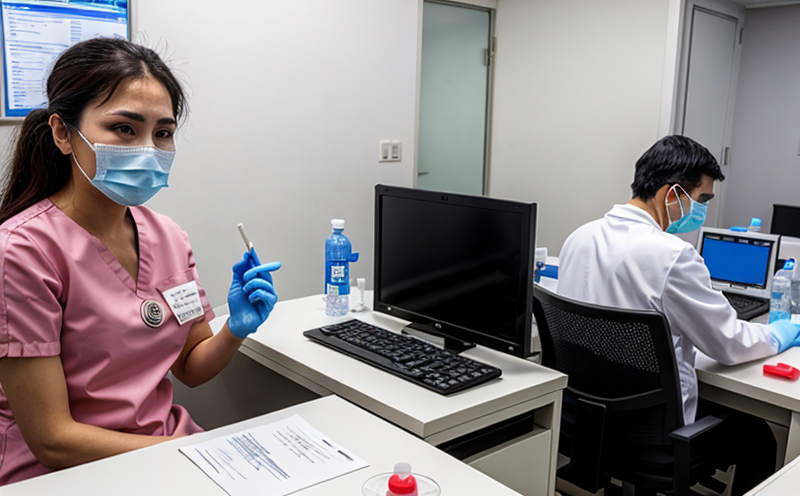Hepatitis A Virus Serological Testing in Food Samples
The Hepatitis A virus (HAV) is a significant public health concern, especially within the food sector. This highly contagious virus can lead to severe liver disease if not properly controlled and managed. Our serological testing service provides unparalleled accuracy and precision for identifying HAV in food samples. This method is based on detecting antibodies produced by the immune system in response to an infection with the Hepatitis A virus.
The process involves collecting a sample from suspected contaminated food items, which are then tested using immunoassay techniques. These tests detect specific antigens or antibodies that indicate past or current exposure to HAV. The results provide critical information for ensuring food safety and compliance with international standards such as ISO 21528:2013.
For accurate testing, it is essential to follow strict specimen preparation protocols. Samples must be handled in a controlled environment to prevent contamination. After collection, the samples are transported to our laboratory where they undergo rigorous testing procedures. Our team uses advanced equipment and methodologies to ensure reliable results.
The significance of this test extends beyond mere compliance; it plays a pivotal role in safeguarding public health by identifying potential sources of infection early on. By detecting HAV antibodies in food, we can take proactive measures to prevent the spread of disease. This service is particularly important for sectors dealing with high-risk products like raw meats, shellfish, and other perishable items.
Our testing process adheres to strict quality control measures ensuring consistent accuracy across all tests conducted. Compliance officers and R&D engineers rely on these results to make informed decisions regarding product development and safety protocols. Furthermore, this service supports the broader goals of food safety initiatives by providing robust data that can be used in risk assessment.
In summary, Hepatitis A virus serological testing offers a vital tool for maintaining high standards of food safety. It is an indispensable part of any comprehensive quality management strategy aimed at protecting consumers from harmful pathogens like HAV.
Why It Matters
The importance of detecting the presence of Hepatitis A virus serologically in food samples cannot be overstated, especially given its potential impact on public health. The virus can cause acute liver disease which may lead to serious complications including jaundice, fatigue, nausea, and abdominal pain. In severe cases, it could result in hospitalization or even death.
Given the nature of HAV transmission through contaminated food products, understanding the prevalence within various types of foods is crucial for effective prevention strategies. By implementing regular testing protocols, manufacturers can identify risks early enough to implement corrective actions before they become widespread issues affecting large populations.
This testing method helps establish a baseline level of contamination which serves as an indicator of overall food safety practices. It also assists in tracking trends over time allowing continuous improvement towards better hygiene standards and safer production processes.
Why Choose This Test
- Accurate Detection: Utilizing state-of-the-art immunoassay technologies ensures precise identification of HAV antibodies.
- Rigorous Compliance: Adherence to international standards like ISO 21528:2013 guarantees consistent quality and reliability.
- Evidence-Based Decision Making: Provides robust data supporting informed decisions about product safety and process improvements.
- Prompt Response: Early detection allows immediate corrective actions to be taken, minimizing health risks.
- Cost-Effective: Preventative measures are generally less expensive than dealing with outbreaks or recalls.
- Expertise & Experience: Leveraging our team’s extensive knowledge and experience in virology enhances the credibility of results.
Choosing this test ensures not only regulatory compliance but also contributes significantly to maintaining public trust by demonstrating a commitment to food safety.
Use Cases and Application Examples
- Raw Meat Processing Plants: Regular testing helps ensure that raw meat products meet stringent hygiene standards set forth by regulatory bodies.
- Seafood Suppliers: Detecting HAV in shellfish prevents the sale of potentially dangerous products to consumers.
- Restaurant Chains: Implementation ensures consistency across different locations, maintaining high standards throughout their supply chain.
In addition to these examples, this testing method finds application in various other scenarios including but not limited to:
- Investigating outbreaks linked to specific food products,
- Evaluating new processing techniques for increased safety,
- Monitoring imported goods to ensure they meet local health requirements.
The versatility of this testing method makes it an indispensable tool in safeguarding public health and ensuring food quality.





